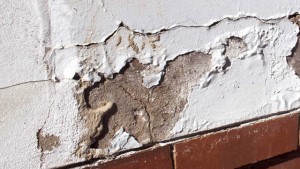The source of this particular problem could be a water leak or high humidity. Both can lead to mold, mildew, or other biological growths. Depending on the severity, conditions can lead to rot, structural damage, premature paint failure, and a variety of health problems. Water can seep into your home from the outside through cracks or spacing in the foundation, or small gaps around windows or doors. Water can also get inside your house from a leaking water pipe, toilet, shower or bathtub. High indoor humidity levels are also caused by normal everyday living, such as showering, cooking, and drying, which could also be a source of the problem. A damp basement is commonly caused by moisture migrating through a concrete foundation. There may not be visible signs of leaks or standing water, but the moisture evaporates, increasing indoor humidity. Another common cause is condensation, which takes place on cold surfaces, like concrete walls or floors, during humid months.
Reducing indoor humidity:
- If your basement has a dirt floor, cover the floor completely with plastic or install vapor barrier to stop water vapor from coming through the soil.
- Use ventilation fans in kitchens and bathrooms to control moisture. Make sure your ventilation fans are venting directly to the outside. In some cases the ventilation may have been installed to vent into the attic or become disconnected or blocked.
- Your clothes dryer should also be vented directly outside via a vent duct. Make sure it is attached securely to the dryer and check that it is clear of any and all obstructions. Check for holes that leak air. If your vent duct is damaged or too old, replace it with a metal duct. Also, make sure you clean your vent duct at least once a year.
- Get a heating and cooling contractor to check your air conditioning system to make sure it is sized and operates properly to remove humidity. If your system is too big or the airflow is incorrect, your air conditioner will not remove humidity as efficiently as it should.
- Sealing air leaks in your vent ducts, around your windows, and doors can help to prevent high humidity levels in your home.
- During hot humid months, use a dehumidifier in your basement to reduce condensation on the walls. This might work better once you’ve taken care of all the air leaks to reduce the amount of humid outdoor air you are letting into the basement.
Stop water leaks:
- If a leak is the source of your problem, have it taken care of first.
- Clean rain gutters and redirect the downspout runoff away from the foundation.
- Make sure the ground around the house slopes down away from the foundation. If necessary, re-grade it so the ground does slope away.
- If you have a sump pump, make sure it is working properly.
- If you have water stains on the ceiling or wall or a bathroom, it could be a leak from a water pipe, toilet, bathtub or shower. Hire a plumber to repair that leak.
- If the leak has caused substantial water damage or mold, you might want to hire a contractor who specializes in mold remediation and water damage repairs.


